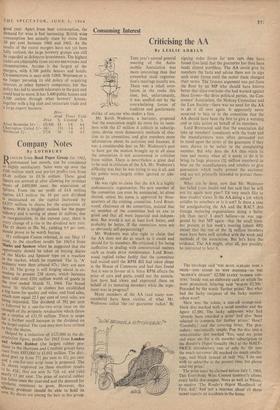Consuming Interest
Criticising the AA
By LESLIE ADRIAN THIS year's annual general meeting of the Auto- mobile Association was more interesting than that
!Al somewhat staid organisa- tion's meetings usually are.
Mr. Keith Wedmore, a barrister, proposed that the association might do more for its mem- bers with the £7 million it collects in subscrip- tions, devise more democratic methods of elec- tion to its committee, and give members more information about its activities and finances. It was a considerable feat on Mr. Wedmore's part to have got the motion brought up at all since the association is not accustomed to criticism from within. There is nevertheless a great deal to be said in criticism of the AA. Mr. Wedmore's difficulty was that he was trying to say it all, and his points were ,largely either ignored or side- stepped.
He was right to claim that the AA is a highly undemocratic organisation. No new member of the committee can even be nominated, let alone elected, unless his name is approved by three- quarters of the existing committee. Lord Brent- wood, chairman of the committee, insisted that no member of the committee had an axe to grind and that all were impartial and indepen- dent. But would it not at least look better,, and probably be better, if the committee were not so obviously self-perpetuating?
Mr. Wedmore was also right to claim that the AA does not do as much as it could and should for its members. He criticised it for being ineffective in dealing with controversial matters such as resale price maintenance. Lord Brent- wood replied rather feebly that the committee had waited until the RPM Bill had taken shape in the House of Commons and had then found that it was in favour of it. Since RPM affects the price of cars and parts, could not the associa- tion have had views and . expressed them on behalf of its motoring members while the argu- ment was in progress?
Many members of the AA (and many non- members) have been victims of what Mr. Wedmore called 'the car guarantee racket.' By signing order forms for new cars they have found (too late) that the guarantee has then been made almost worthless. The AA could give its members the facts and advise them not to sign such order forms until the motor trade changed their terms. The fatuous argument was put from the floor by an MP who should have known better that since everyone else had warned against these forms—the three political parties, the Con- sumers' Association, the Molony Committee and the Law Society—there was no need for the AA to do it all over again. It apparently never occurred to him or to the committee that the AA should have been the first to give a warning and to take action on behalf of its members.
Lord Brentwood said that the association did take up members' complaints with the trade and the manufacturers were often persuaded not to stand upon the terms of the guarantee if they were shown to be unfair to the complaining member. But why does the AA thus waste its time and money when all it needs to do is to bring its huge pressure (3+ million members) to bear on the manufacturers and retailers to give guarantees which really protect the customer and are not primarily in-tended to protect them- selves?
What can be done, now that Mr. Wedmore has failed (cum laude) and has said that he will not try again next year? I'd very much like to hear readers' views. Is the AA doing a job which satisfies its members or is it not? Is there a case for amalgamating the AA and the RAC? Are foreign motoring organisations doing a better job. than ours? I don't believe—as was sug- gested by that MP again—that the small num- ber present at last week's meeting (about 400) meant that the rest of the 31 million members must have 'been well satisfied with the work and methods of the association. But let's have the evidence. The AA might, after all, just possibly be interested to hear it.
The envelope said 'YOU HAVE ALREADY WON A PRIZE—AND STAND TO WIN ANOTHER—IN THE "READER'S DIGEST" £2,500 LUCKY NUMBER CON- TEST.' Inside was an elaborate card on which the most prominent lettering said 'WORTH £2,500.' Preceded by the words 'further prizes.' But what had the lucky recipient of the lucky number token won?
Here was the token, a tear-off orange-and- black disc marked with a serial number and the figure £2,500. The lucky addressee who had 'already been awarded a prize' had also 'been selected to compete for further prizes.' How? 'Carefully,' said the covering letter. The pro- cedure: moronically simple. Pop the disc into a semi-circular slot marked 'Yes, send my prize and enter me for a six months' subscription to the Reader's Digest (usually 18s.) at the HALF- PRICE introductory rate of only 9s.' Or into the much narrower slit marked (in much smaller type, and black instead of red) 'No, I do not wish to subscribe at the present time, but please send my prize.'
The prize must be claimed before July 1, 1964. This Everybody Wins Contest (contest?) allows every lucky disc-popper, Noes as well as Yesses, to receive 'The Reader's Digest Handbook of First Aid.' And not a murmur about all those recent reports on accidents in the home.






































 Previous page
Previous page